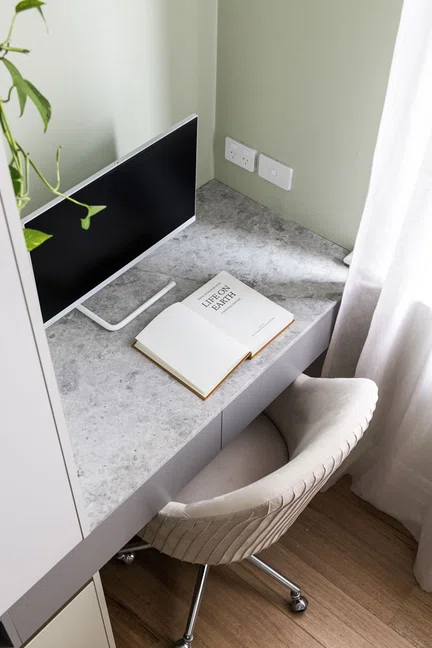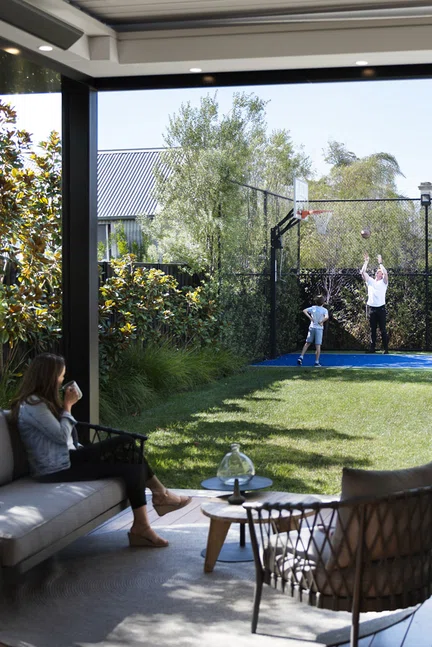


How we live in our homes is changing

LUCY FEAGINS
Editor, The Design Files
The concept of ‘home’ looks very different to this time two years ago. In the last 18-months we have seen the entire world bunker down in their homes. What has come out of this is a re-evaluation of how and with whom we spend our time, that has in turn allowed us to consider our domestic spaces in more careful detail than ever before. The pandemic has led to a reassessment of how the design, layout, and location of our homes contributes to our sense of comfort and community. Here, we investigate the post-pandemic future of how we live in our homes.
Home Offices
Dr Nichola Powell, chief economist from Domain, researched the data on how our lifestyle changes in 2020 influenced a rapid change in what we were searching for in our next homes:
Prior to the pandemic, the use of the search term 'home office' was infrequent. This search term skyrocketed in popularity during the height of the pandemic, with the use of 'home office' to tailor a property search soaring by 605% in the June quarter, compared to the March quarter of 2020*. The importance of a dedicated workspace has hit the home wish list.
When we first entered lockdown last year, working from home for most people consisted of a dining room table or a simple desk set-up. In the future, spatial organisation will change. For some, the home office will be a separate room with large windows, blackout curtains, and comfortable, ergonomic furniture.
In addition to being a place of sanctuary during this time of global instability, our homes have also become multi-functional, hard working spaces, quickly adapting to accommodate online learning and working from home. Long term, home design will shift to reflect these ongoing needs. We’ll see a return of the dedicated home office (rather than 'study nook'), and a shift away from totally open-plan living, to more carefully 'zoned' floorplans, where work life and family life can co-exist comfortably under one roof.

Space
The pandemic has also spotlighted the importance of having a hard-working home. One that can stretch to accommodate adult children moving back home, or a kitchen and dining area that doubles as an office desk, classroom and cafe. Extra space in homes is now a highly sought-after commodity, with many buyers upsizing earlier than they ever intended, or downsizers opting for new developments with an emphasis on space, greenery and light.
Beyond being house proud, the way we live in our homes now is about creating a feeling of health and happiness through ample space and light.
Now more than ever, we’re looking for homes that don’t just look good – but homes that genuinely feel good to be in. So, what makes a home feel good? Generous proportions, natural light, good ventilation, good acoustic insulation, stable thermal properties (not too cold in winter, not too hot in summer) and, ideally, some connection to the outdoors. These factors will push some homebuyers out of their 'wish list' suburbs, further afield and potentially into new neighbourhoods, if it means a more comfortable, spacious and feel-good home.

Natural Light & the Outdoors
After the keyword search ‘study’, ‘outdoor’ had the second-highest year-on-year growth in the second half of 2020*.
For many, the prolonged impact that staying inside had on our physical and mental wellbeing, meant that people increasingly prioritised natural light and access to nature.
The pandemic gave us a heightened appreciation for the natural world. Whether through a backyard, balcony, rooftop, or even parks and green spaces, the best cure for cabin fever is the great outdoors.
Home Improvements
With our homes becoming our sanctuaries more than ever before, and with plenty of time to get to the renovations we’ve been meaning to get to, our homes are improving with an eye toward making them serve more people and more purposes now and into the future. With house prices surging, and more time than ever being spent within the family home, home improvements and renovations have become a high priority for many Australian homeowners.
The experience of the last 18-months will no doubt have a lasting impact on us and our homes. Many are rethinking the kind of life they want to live post-pandemic, as well as the role their homes play in this. One thing is certain, our homes are looking lighter, brighter and more spacious than ever before.
*Source: Domain, RealEstate.com.au
© Jellis Craig 2021


